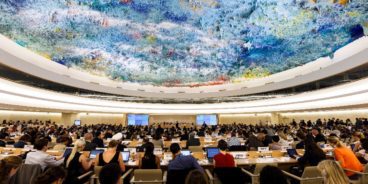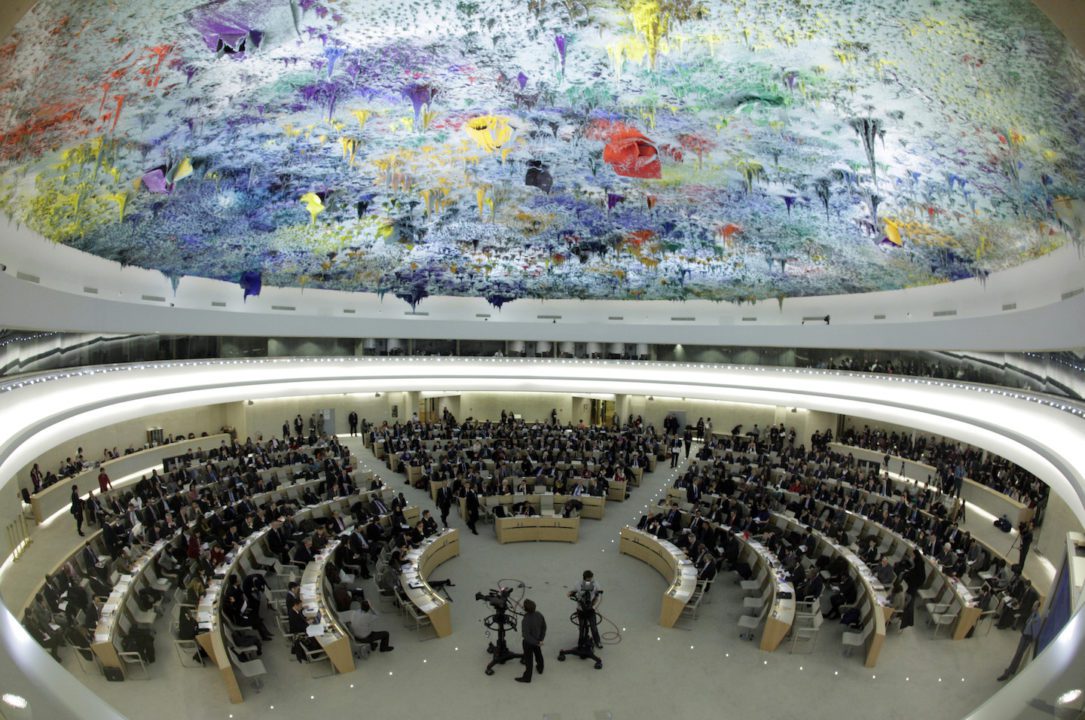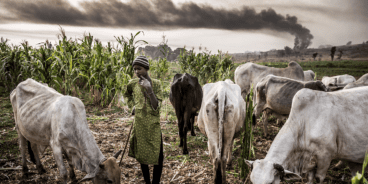

R2P and Outcomes of the Human Rights Council’s 40th Session
The 40th regular session of the Human Rights Council (HRC) was held in Geneva between 25 February and 22 March 2019. As the primary international human rights body, the Human Rights Council has the capacity to prevent and respond to mass atrocity crimes, as systematic violations and abuses of human rights can be potential indicators of genocide, war crimes, crimes against humanity or ethnic cleansing. The summary below highlights major outcomes and relevant dialogues from the 40th session as they relate to the Responsibility to Protect (R2P) populations from such crimes. As part of the session, the Netherlands delivered a statement on behalf of members of the Group of Friends of R2P.
RESOLUTIONS
A/HRC/40/L.7 The Human Rights Situation in the Syrian Arab Republic
Deploring the fact that the conflict in the Syrian Arab Republic continues into its ninth year with devastating consequences for the civilian population, the HRC reiterated that the only sustainable solution is through an inclusive, Syrian-led and Syrian-owned political process under the auspice of the UN. The HRC further urged all parties to the conflict to comply with their respective obligations under international human rights and humanitarian law, and demanded that parties, particularly Syrian authorities and their State and non-State allies, refrain from carrying out attacks against the civilian population. The HRC reaffirmed the importance of establishing appropriate justice, reconciliation, truth and accountability processes and mechanisms, and welcomed steps taken by member states to prosecute perpetrators by utilizing the principles of universal and extraterritorial jurisdiction. Expressing its deepest concern at the findings of the Independent international Commission of Inquiry (CoI) on the Syrian Arab Republic, the HRC extended the mandate of the CoI for a period of one year. The HRC also decided to transmit all reports and oral updates of the CoI to all relevant bodies of the UN and recommended the continuation of briefings to the Security Council. The resolution was adopted by a vote of 28 in favor, 5 against and 14 abstentions. The HRC further recalled that “the primary responsibility to protect the Syrian population lies with the Syrian authorities” and demanded that “the Syrian authorities meet their responsibility to protect the Syrian population.”
A/HRC/40/L.8 Promotion and protection of human rights in Nicaragua
The HRC expressed its grave concern regarding serious human rights violations and abuses in Nicaragua, beginning in April 2018 with the disproportionate use of force by the police against protestors, acts of violence committed by armed paramilitary groups, as well as reports of ongoing unlawful arrests and arbitrary detention, torture and sexual and gender-based violence. The HRC expressed concern about increasing restrictions on civic space, including the closure of independent media outlets and acts of intimidation committed against civil society organizations. The HRC deeply regretted the government’s decision to withdraw the invitation extended to the Office of the High Commissioner for Human Rights (OHCHR) to visit Nicaragua. The HRC also regretted the government’s decision to suspend the mission of the Interdisciplinary Group of Independent Experts and withdraw the invitation extended to the Special Follow-up Mechanism for Nicaragua, both of the Inter-American Commission on Human Rights (IACHR). The HRC called upon the government to resume its cooperation with OHCHR and the IACHR and urged the government to release all those arbitrarily detained. The resolution was adopted by a vote of 23 in favor, 3 against and 21 abstentions.
A/HRC/40/L.16/Rev.1 Situation of human rights in South Sudan
The HRC expressed alarmed at the report of the Commission on Human Rights in South Sudan (CoHR), which noted that some of the human rights violations and abuses recorded may amount to crimes against humanity and war crimes. The Council condemned ongoing violations of international law, including widespread sexual and gender-based violence committed against women and girls and instances of conflict related rape, used as a weapon against the civilian population. While welcoming the signing of the Revitalized Peace Agreement on 12 September 2018, the HRC called upon all parties to fully implement it. The HRC further emphasized the importance of the agreed principles for transitional justice and the establishment of the hybrid court for South Sudan and stressed that those responsible for violations and abuses of international law should be held accountable. The HRC extended the current mandate of the CoHR for a period of one year. The HRC further requested the CoHR share its report and recommendations with the African Union and all relevant organs of the UN, including the Mission in South Sudan (UNMISS). The resolution was adopted without a vote. The HRC further recalled that “the Government of South Sudan has the responsibility to protect all of its population in the country from genocide, war crimes, ethnic cleansing and crimes against humanity.”
A/HRC/40/L.18 Situation of human rights in the Democratic People’s Republic of Korea
The HRC expressed deep concern at the systematic, widespread and gross human rights violations in the Democratic People’s Republic of Korea (DPRK) which, in many instances, constitute crimes against humanity. It further warned about the precarious humanitarian situation that is exacerbated by the restrictions imposed by the government on the free and unimpeded access for humanitarian agencies to populations in need. While welcoming ongoing diplomatic efforts, the HRC restated its grave concern about the findings of the CoI on DPRK, which had reasonable grounds to believe that crimes against humanity, including extermination, murder, enslavement, torture, imprisonment, rape, forced abortions, persecution on political, religious, racial and gender grounds and enforced disappearances, have been committed pursuant to policies established at the highest level of the State. The HRC encouraged all states, the UN system and other stakeholders, to cooperate with accountability efforts and to ensure that these crimes do not remain unpunished. The HRC decided to continue to strengthen the capacity of OHCHR’s field-based structure in Seoul. The HRC further decided to extend the mandate of the Special Rapporteur on the situation of human rights in DPRK for a period of one year and requested the Special Rapporteur to submit regular reports to the HRC and to the General Assembly. The resolution was adopted without a vote. The HRC further recalled “the responsibility of the Democratic People‘s Republic of Korea to protect its population from crimes against humanity.”
A/HRC/40/L.19 Situation of human rights in Myanmar
Expressing grave concern at continuing reports of serious human rights violations and abuses in Myanmar, the HRC called upon the Myanmar authorities, in particular the military and security forces, to immediately end all violence and violations of international law. The HRC deeply regretted the decision of the Government of Myanmar to discontinue cooperation with the Special Rapporteur on the situation of human rights in Myanmar and to deny her access to the country since January 2018. The HRC called for the expeditious entry into operation of the ongoing independent mechanism, established by the HRC in Resolution 39/2 to collect, consolidate, preserve and analyze evidence of the most serious international crimes and violations of international law committed in Myanmar since 2011. The HRC further reiterated the urgent need to ensure that all those responsible for crimes under international law are held to account and recalled the authority of the UN Security Council to refer the situation in Myanmar to the International Criminal Court (ICC). The HRC further stressed the need to create conditions conducive to the safe, voluntary, dignified and sustainable return of Rohingya refugees and other forcibly displaced persons. The HRC decided to renew the mandate of the Special Rapporteur on the situation of human rights in Myanmar for a period of one year. The resolution was adopted by a vote of 37 in favor, 3 against and 7 abstentions.
A/HRC/40/L.25 Ensuring accountability and justice for all violations of international law in the Occupied Palestinian Territory, including East Jerusalem
The HRC expressed grave concern about reports of serious human rights violations and grave breaches of international humanitarian law, including possible war crimes and crimes against humanity, including the findings of the Independent International CoI on the Protests in the Occupied Palestinian Territory (OPT) and of the Independent CoI
on the 2014 Gaza conflict. The HRC deplored the non-cooperation by Israel with all HRC fact-finding missions and CoIs, and the refusal to grant access to international human rights bodies and a number of UN special procedures seeking to investigate alleged violations of international law in the OPT. Emphasizing the need to ensure that all those responsible for violations of international humanitarian law and international human rights law are held to account through appropriate, fair and independent national or international criminal justice mechanisms, the HRC called upon the parties concerned to cooperate fully with the preliminary examination of the ICC. The HRC requested OHCHR to strengthen its field presence in the OPT, particularly in the Gaza Strip. The resolution was adopted by a vote of 23 in favor, 8 against and 15 abstentions.
A/HRC/40/L.27 Human rights situation in the Occupied Palestinian Territory, including East Jerusalem
The HRC expressed grave concern about continuing violations of international humanitarian law and the systematic violation of the human rights of the Palestinian people by Israel, including those arising from the excessive use of force and military operations; the arbitrary detention of Palestinians; the use of collective punishment; the closure of areas; the confiscation of land; and the establishment and expansion of settlements and the construction of a wall in the OPT in departure from the Armistice Line of 1949. The HRC further warned about the disastrous humanitarian situation in the Gaza Strip, including suffering exacerbated by the blockade. The HRC is convinced of the need for an international presence to monitor the situation and demanded that Israel withdraws from the Palestinian territory occupied since 1967, including East Jerusalem. The resolution was adopted by a vote of 39 in favor, 3 against and 5 abstentions.
ESTABLISHMENT AND EXTENSION OF COMMISSIONS OF INQUIRY AND SPECIAL PROCEDURES
The HRC extended the mandate of the Special Rapporteur on the situation of human rights in the Democratic People’s Republic of Korea and the Special Rapporteur on the situation of human rights in Myanmar for one year.
The HRC also extended the mandate of the Commission on Human Rights in South Sudan and the Commission of Inquiry for the Syrian Arab Republic for one year.
Read Next

Related Publications

Atrocity Alert No. 445: Sudan, Syria and Eritrea

Atrocity Alert No. 444: Nigeria, Haiti and South Sudan
